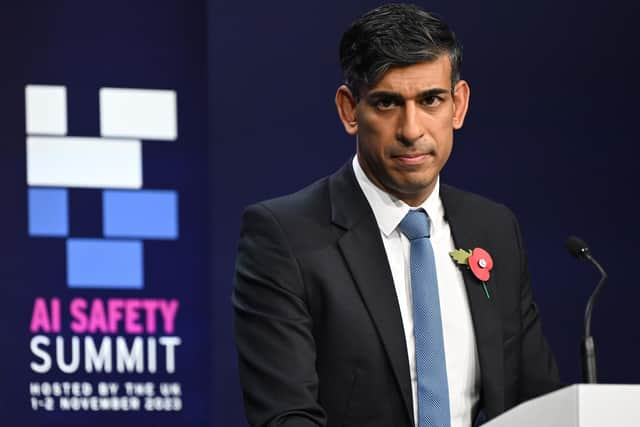Artificial Intelligence: Rishi Sunak claims AI Safety Summit has tipped 'the balance in favour humanity'
Rishi Sunak has claimed the UK’s Artificial Intelligence (AI) safety summit will "tip the balance in favour of humanity" after tech companies agreed to work with governments to test the safety of their models before their release.
The Prime Minister claimed AI companies had reached a “landmark agreement” as he announced a string of future summits to follow in France and South Korea.
Advertisement
Hide AdAdvertisement
Hide AdTaking place at Bletchley Park, home of Britain's Second World War codebreakers, the event saw experts and politicians discuss the threats and opportunities of AI.


Speaking at a press conference, the Prime Minister said: “While this was only the beginning of the conversation, I believe the achievements of this summit will tip the balance in favour of humanity, because they show that we have both the political will and the capability to control this technology, and secure its benefits for the long term.”
Mr Sunak said this had been achieved by establishing a shared understanding of the risks, a global expert panel that will publish a state of AI science report and reaching an agreement on testing the safety of new AI models before they are released.
Mr Sunak acknowledged the risk of AI upending jobs was causing “anxiety”, on the same day technology secretary Michelle Donelam admitted a "Terminator-style" loss of control was the biggest AI risk. However, he insisted the technology should be regarded as a “co-pilot” that could make jobs easier.
“I’m of the view that technology like AI which enhances productivity over time is beneficial for an economy,” he said. “It makes things cheaper, it makes the economy more productive. But that doesn’t mean jobs can change.”
The Prime Minister said people should not be worried because “because we’re developing the education and skills system that we need to ensure everyone can flourish over the years and decades to come”.
Mr Sunak praised the agreement as a cause for celebration, with concerns over transparency and how AI tools are used.
The Prime Minister admitted that ultimately “binding requirements” would likely be needed over AI, but argued now was the time to move quickly without laws.
Advertisement
Hide AdAdvertisement
Hide AdHe said: “The lesson is that we need to move quickly and that’s what we’re doing. The technology is developing at such a pace that governments have to make sure that we can keep up.
“Now, before you start mandating things and legislating for things I think a) by the way that takes time and we need to move faster, and we are, but secondly you need to know exactly what you’re legislating for and that’s why our safety institute is so important.
“So far we’ve got the co-operation we need, but, of course, I think everyone would acknowledge, ultimately, binding requirements will likely be necessary. But it’s important that we do those in the right way and that needs to be based on empirical evidence that we’ll get from our testing.”
There was also a defence of his decision to invite China to the summit, which had sparked a backlash from some of his own MPs amid security fears.
Mr Sunak said it wasn’t “an easy decision” to invite China, but it had worked as the country had signed up to the same rules as other nations.
Comments
Want to join the conversation? Please or to comment on this article.
